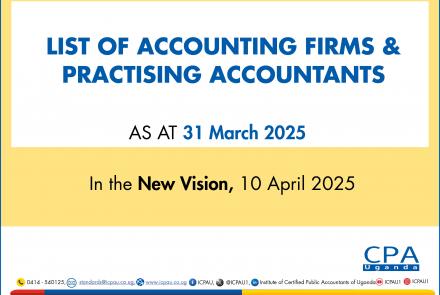Tech-savviness is key for practising accountants - Kalinda and Associates
- Tell us about Kalinda & Associates. What does the firm do? How big is the team? What services do you offer?
Kalinda & Associates is a professional services accounting firm registered and licensed by the Institute of Certified Public Accountants of Uganda to offer all accounting services since June 2017. It started as a sole practice and now a partnership firm, with CPA Kalinda Gonzaga Joseph as the Managing Partner and CPA Kakande Christopher as the other partner. The firm is located in Kisaasi, Midland Complex on Kisaasi-Bahai Road. We are registered tax agents. We are also prequalified by Bank of Uganda for audit of forex bureaus, prequalified by the Insurance Regulatory Authority for audit of insurance players, and prequalified by the Office of the Auditor General and the Ministry of Trade and Industry for the audit of SACCOs.
The firm offers a variety of accounting services including Audit and Assurance, Tax Consultancy and Advisory Services, Business Advisory, Anti Money laundering audits, Tax and Business Training Services as well as Book keeping services.
We currently have a team of seven (7) staff plus the 2 partners.
- Why does the country need accounting firms and practising accountants?
Accounting firms and practising accountants provide a wide range of benefits to businesses:
- Providing professional business advice in terms of recommending best business practices such as which products to concentrate on, which markets work, sector/departmental performances. This improves revenue collection.
- Accounting firms also help businesses to improve their internal controls which reduces losses and improves performance and hence higher taxes paid.
- They advise businesses and the government on matters of compliance with laws and regulations such as tax, environmental, regulatory compliances
- Accounting firms assist businesses in sourcing and also advising on cheaper capital sources. Audited accounts are a prerequisite for funders of businesses
- Firms help to measure business performance both internally and externally in form of trends analysis, market contributions and positions. Accountants contribute directly to the country’s budgeting process.
- Advising entities during times of business restructuring, mergers and acquisitions by proposing best structural types, business valuation etc.
- The firms and their practising accountants are a contributor to the country’s tax and economic policy reviews, recommendations and reforms through their advice on monetary and fiscal policies.
- Firms help businesses to get advice regarding their tax matters such as accurate computation of taxes, objections, tax representation, tax audits and appeals.
- What do you envisage the role of accounting firms and practising accountants to be in the next five years?
The world is changing fast and the role of the accountant is evolving. Accountants, therefore, need to be the future-fit accountants to remain relevant;
- Utilisation of digitisation, automation and artificial intelligence for decision making and business growth.
- Ensuring efficient and effective processes and workflows within an organisation.
- Leading strategically to facilitate change and influence decisions in the organisation. Accountants to aim for the top leadership positions.
- Update internal and external stakeholders about the value in the organisation, opportunities and challenges.
- Professional objectivity and living to the fundamental principles.
- Protection of organisational reputation through effective governance and control.
- What do you look out for while recruiting the audit team?
Our tests on staff while recruiting revolve around 5 major factors below;
- Technological knowledge; staff must be aware of the use of accounting software, Microsoft Office packages as well as audit software, and or ready to learn the same to save time spent on assignments.
- Integrity is key. Our integrity checks are a must, prior to the physical interviews.
- Collaboration and teamwork. Our interview questions must include scenarios that test whether the prospective staff is able to work with others, delegate and or consult where possible.
- We search for effective communicators both orally and in writing.
- Problem-solving skills and innovation.
- What have you done to ensure that human capital serves the best interests of the firm?
- Effective training of staff through internal and external Continuing ProfessionL Development trainings.
- Making sure staff are aware of and also contribute towards the firm vision and mission.
- Staff are made to sign independence and confidentiality statements every year.
- Effectively engaging staff to read and be up to date with the staff rules and regulations.
- Ethical principles are reviewed and taught to staff every year.
- Frequent performance evaluations to test individual contributions towards work.
- Having a reward mechanism based on output rather than presence.
- How does one prepare oneself for a career in public practice?
Public practice is a term used to describe accountancy firms that are operated by individuals in sole proprietorships or groups of individuals in partnerships. In simple terms, this means starting an audit firm. One needs to consider a number of aspects before choosing this career path.
- Whether you have the required experience in conducting external audits, especially at a senior level for at least a period of 3 years as required by the Accountancy Practice Regulations.
- Consider whether you will work alone (sole practitioner) or in partnership and identify individuals who are professional and have similar career goals and ambitions.
- Assess your core competences and determine whether your offering of services and experience in the areas you want to specialise in will make you break through to the market, and be able to survive and grow.
- Consider your source of financing for the initial expenses such as office operations, literature requirements, licensing requirements and day-to-day operations. It is advisable to have a budget and assume no income in the first year, whether the firm and the owners will be able to sail through with ease.
- Have a proper marketing strategy that you feel will enable people to accept your service offerings and become your clients. It is better to have at least a five year strategic plan for the firm.
- Consider the ethical requirements of the profession as your guiding areas such as integrity, objectivity, confidentiality, competence and professional behaviour so as not to be caught on the wrong side for disciplinary action.
- What makes an excellent practising accountant?
- Should value personal and professional integrity. Integrity is everything.
- Great communication skills, being able to explain complex concepts in an easy to understand term or way.
- Strong work ethic. Being able to meet deadlines many times working for longer hours, from various locations.
- Paying close attention to details. Accountants are always skeptical in their work life.
- Being tech-savvy. Accountants work with various accounting software as well as audit software. However, there are also CRM software and apps that come up from time to time which auditors should be ready to embrace. With AI, remote audits are the talk of town.
- Being trustworthy and reliable. You should handle work carefully and also complete tasks.
- Being adaptable. Many times accountants work in stressful environments and changing terrain. Great accountants adapt easily to changes in legislation, technology and work environments.
- Time management. Accounting work is governed by deadlines. Therefore there is need to manage your time well to meet deadlines. But also time management in case of meetings with clients and stakeholders is key.
- How are the International Standards on Quality Management relevant to accounting firms?
ISQM guide audit firms to review their quality control systems and determine the risks that impact audit quality with reference to guidance in the following areas;
- Help firms commit to quality as a firm culture for quality recognition and enforcement.
- Define roles, responsibilities and accountability of leadership, including qualifications required and undertaking performance evaluations.
- Define the importance of quality in the firm’s strategic decisions in relation to financial and operation priorities.
- Assert the firm’s role in serving public interest by always performing quality engagements


